How to remove your personal information from the Internet [2025]
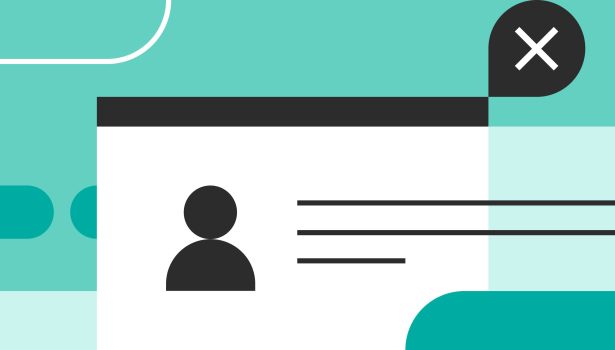
All of your online accounts reveal some personal information. Individual blog posts or social profiles may not say much, but you probably have hundreds of these data points all across the internet.
Then there are data brokers that collect your personal information from public records, package it into “background reports”, and sell them without your knowledge.
Anyone who gets hold of this data can learn a great deal about you. Marketers use it to create profiles that reflect potential customers for personalized advertising. On the other hand, cybercriminals use your personal information to craft social engineering attacks to steal your identity or defraud you.
The best way to keep your digital identity safe is to prevent bad actors from gaining access to your private data in the first place. Read on to find out how you can remove personal information from the Internet and protect yourself from scams and fraud.
Why is it important to remove personal information from the Internet?
An estimated 300 million Google searches for personal information are made every single day. Many of these searches lead users to data broker sites that have accumulated personal information about people like you and make it available to anyone willing to buy it.
Some details revealed by data broker sites such as your full name, home address, and phone number are available for free. More sensitive details like your family ties, credit score, political and religious affiliations, criminal charges, and online shopping habits are available for only a small fee.
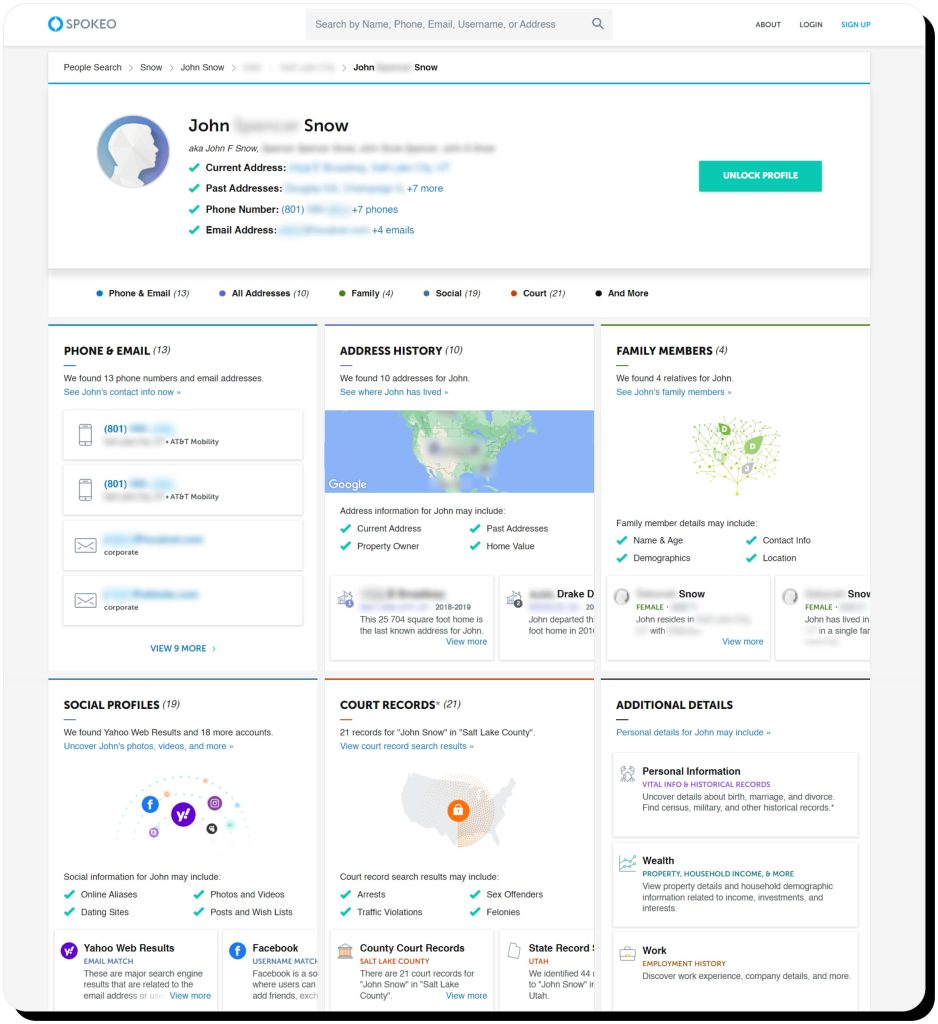
In addition to that, scammers scan your social media accounts, business directories, and Google search results for your name to find even more personal information about you. This can help them to:
- Craft credible scams that even the most security-conscious people might fall for
- Use bits of your data to combine with fake information and create a new, synthetic, identity to commit fraud. Since the synthetic identity has some of your personal details, the fraud may eventually be connected to you and you might be charged with crimes you didn’t commit.
- Steal your identity and make purchases, take out loans, get medical care – all in your name
- Hijack your accounts and steal your money or sensitive data
All this can lead not only to financial loss and credit freeze but to reputation damage as well. You may even be targeted by hate groups for your political or religious affiliations.
To keep your private data safe and reduce the risk of identity theft and other crimes, it’s essential to delete personal information from the Internet. Doing that can also reduce the amount of advertising spam and scam messages you receive.
How to remove personal information from the Internet
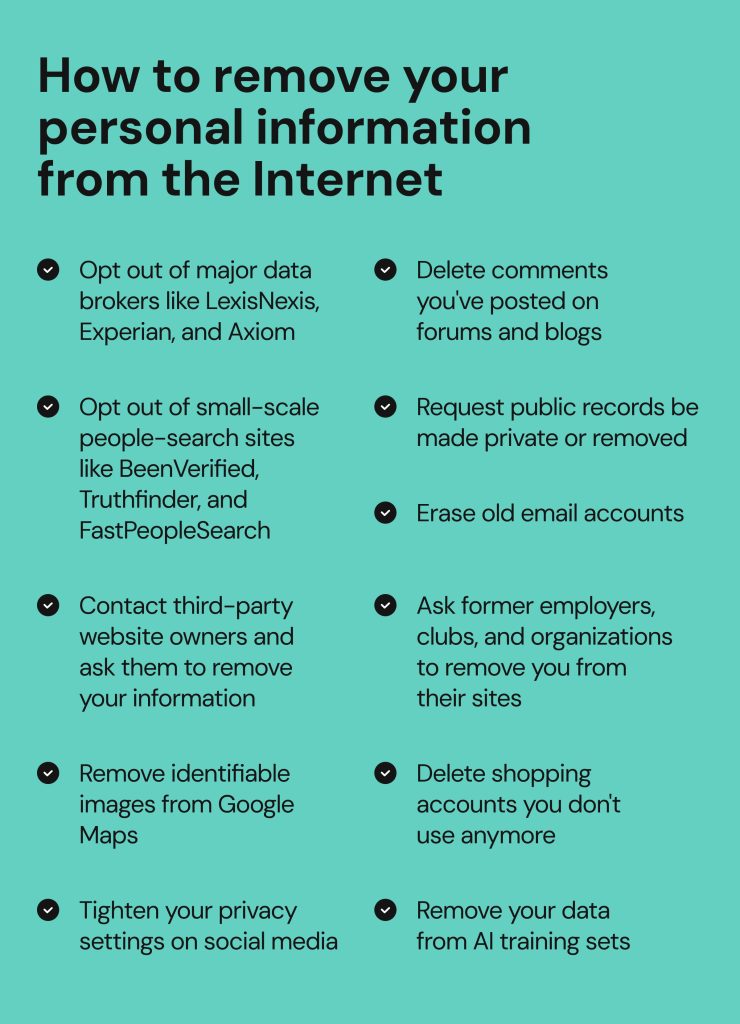
Admittedly, knowing who has access to your personal information isn’t always possible, and sites like data brokers only complicate the issue by operating without your consent.
Therefore, keeping your personal information private requires your constant attention. It also requires taking multiple steps to remove your name, address, online accounts, and other records from public websites. Here’s how to get started.
1. Opt out of major data broker websites
Major data broker sites like Transunion, CoreLogic, LexisNexis, Experian, and Axiom make personal data records available to a wide range of customers. These customers include marketers, advertisers, financial institutions, and even smaller data brokers AKA people-search sites. But nothing stops scammers and cybercriminals from buying information from them as well.
These websites don’t publish their records publicly, which means it can be hard to tell if your personal information is included in their products. However, they collect data from phone companies, digital tracking cookies, internet service providers, and more, so the chances that your info can be found there are pretty high.
Data brokers have to comply with data privacy laws requiring them to let you opt out of their service. However, they are free to make the opt-out process as complicated as they want. As a result, most sites require users to complete a variety of time-consuming bureaucratic tasks before they approve removal requests. They also usually don’t offer any guarantees they won’t collect your personal information in the future.
That said, it is highly important to opt out of major data broker sites to prevent them from spreading your personal information. Use our data broker opt-out guides to learn what steps you need to take to remove your personal data and what challenges you may meet.
2. Opt out of people-search sites
Smaller data brokers include people-search sites like Whitepages, Spokeo, MyLife, BeenVerified, Truthfinder, FastPeopleSearch, and hundreds more. These websites are different from the major data brokers because they publish their data online for everyone to see — which also means you can easily verify whether you’re in their database or not.
More frequently, they present themselves as a kind of search engine for peoples’ past connections. While this might be the case, they also make it very easy for stalkers, scammers, and hate groups to target individuals and commit crimes against them.
If these websites publish your personal information, you’ll need to fill out a removal request form on each site, submit the form, and then check back later to make sure they fulfilled their end of the deal. If they haven’t, you’ll need to contact them again and formally demand they remove your information from the internet. Apart from having to take multiple steps, the opt-out process frequently requires calling, receiving codes via text, and other verification methods – they ask for your email address and phone number, which can lead to them eventually adding these details to your profile and republishing it.
Opting out is a complex and time-consuming process. Onerep can help you automate these takedown requests. Our service scans 231 data broker and people-search websites for your profiles and goes through the removal process on each and every site. Moreover, Onerep uses temporary email addresses and phone numbers in order not to expose your contact data and other personal details to data brokers.
3. Contact website owners and ask them to remove your information
If your personal information is publicly available on a website, you can ask the website owner to take it down. For small-scale personal websites, this process may be as simple as writing an email asking them to comply with data privacy regulations. In most cases, you’ll get a response confirming the personal information has been removed.
If the website owner refuses, you may still be able to take webpages with your personal info off major search engines like Google. Mentioning Google’s policies may also help you convince the website owner to comply as well — since most of them want their websites to rank high on the search engine.
However, it’s important that you pay close attention to how your data ended up on a public website in the first place. If you can find out what kind of data collection methods the website owner used, you may discover other websites that have published your personal information.
Otherwise, it may be very difficult for you to delete personal information from the Internet. For example, if your info is for sale on the Dark Web, you may not be able to remove it at all. In that case, you should adopt better security hygiene to protect yourself from scams and identity theft.
4. Remove identifiable images from Google Maps
Google Maps Street View allows anyone to look at pictures of any home address they wish. There are no privacy laws protecting information that is clearly visible from the street, but you may still feel uncomfortable with the fact that anyone can look up your home and workplace directly on the Internet.
Google automatically blurs faces, but your Street View image may show more information than that. For example, it might show what car you drive, which can make it easier for criminals to determine if someone’s home.
Fortunately, Google does allow people to make deletion requests and prevent online tracking of Google Maps data. All you need to do is navigate to your address and click on the Report a Problem button. Fill out the removal request form and tell Google to keep your data off of the map.
In a few days, Google will blur the address and prevent it from appearing in search results. Other search engines that rely on Google Maps data will follow shortly thereafter. Open the Google Maps phone app to check if your address is blurred.
5. Tighten your privacy settings on social media
Managing your social media accounts is a big part of keeping your digital identity private. Most social media platforms have privacy policies that explicitly allow search engines to access and use members’ data. This data-sharing agreement can easily extend to marketers, people-search websites, and others.
Your social media profile and posts are the main things you should be concerned with. Take a close look at the information you share with the public. If there is anything you wouldn’t want scammers and cybercriminals to know about you, you should delete it or use the platform’s privacy settings menu to change who can access it.
Addressing these privacy issues can go a long way toward giving you more control over your online presence. Removing public posts altogether from your social media accounts can dramatically reduce the risks of identity theft.
Note that some social media sites may publish your history using the platform and interacting with content creators. For example, you can significantly boost your online privacy by clearing your YouTube history and removing personal details from your videos, comments, and other content.
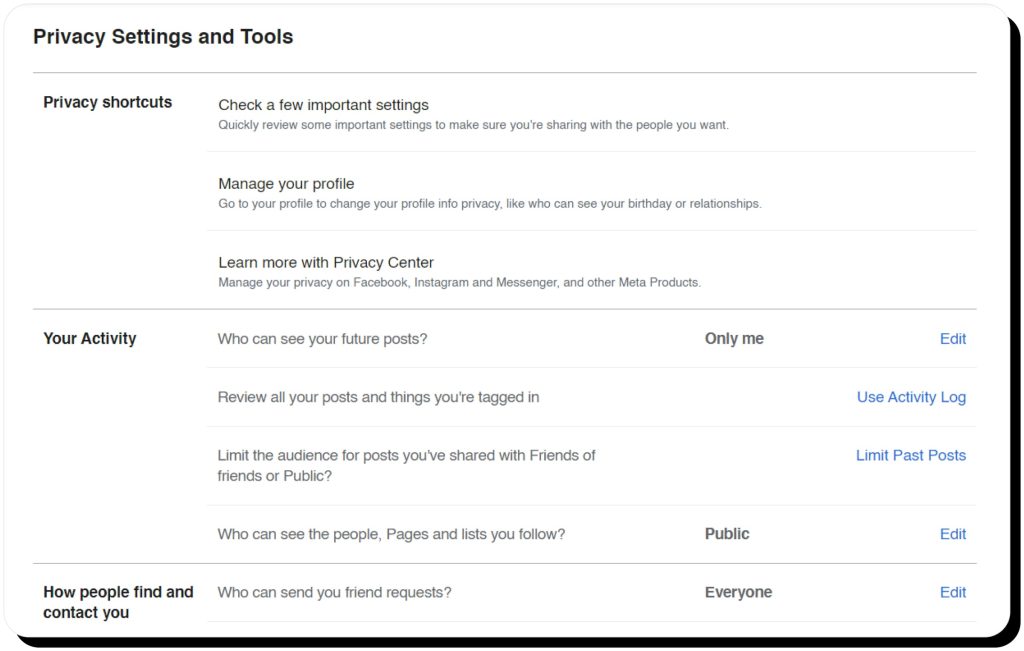
6. Delete comments you’ve posted on forums and blogs
If you interacted with forums, blogs, and other similar websites in the past, your data is still logged there, and it may be public. That means it might show up on Google search results for your name, giving people a clear idea of your interests and activities in the past.
Deleting public comments on forums and blogs is easy, but it can be time-consuming. Most websites do not give users an easy way to delete all the content they contributed to the website at once. Instead, you’ll probably have to go back manually and delete every comment one by one. You’ll need to repeat this for every forum and blog you’ve ever contributed to. If you wrote posts on a personal blog, you’ll also have to delete those manually.
If you spent years participating in a lively online community, you may have hundreds or thousands of comments to go through. Unfortunately, websites have the discretion to choose how users delete content from their sites. Some websites let users deactivate their account and lock their content through their account settings, but it’s not common.
7. Erase old email accounts
Old accounts can create significant risks for your digital identity. That’s because hackers break into these accounts when login credentials are included in major data breaches. If your old email account’s username and password are among the millions of records released on the Dark Web, attackers will easily hijack the account.
This gives them wide access to sensitive information about you, even if it’s outdated. They may even be able to connect your old account to your new one and see more current information about your online presence, including app activities and location history.
Your old email address may also be linked to various online services. Even if you no longer use them, this could give attackers information about your past shopping preferences, political affiliations, financial accounts, and more.
Deleting any accounts you don’t use is an important part of good digital hygiene. If scammers can’t access your email inbox, they won’t be able to use your personal contact info and email history against you. Take time to go through your old and unused email accounts, deactivating them and removing the information they contain from the internet completely. Make sure all the accounts you use today link exclusively to your primary email address, and keep that email address safe.
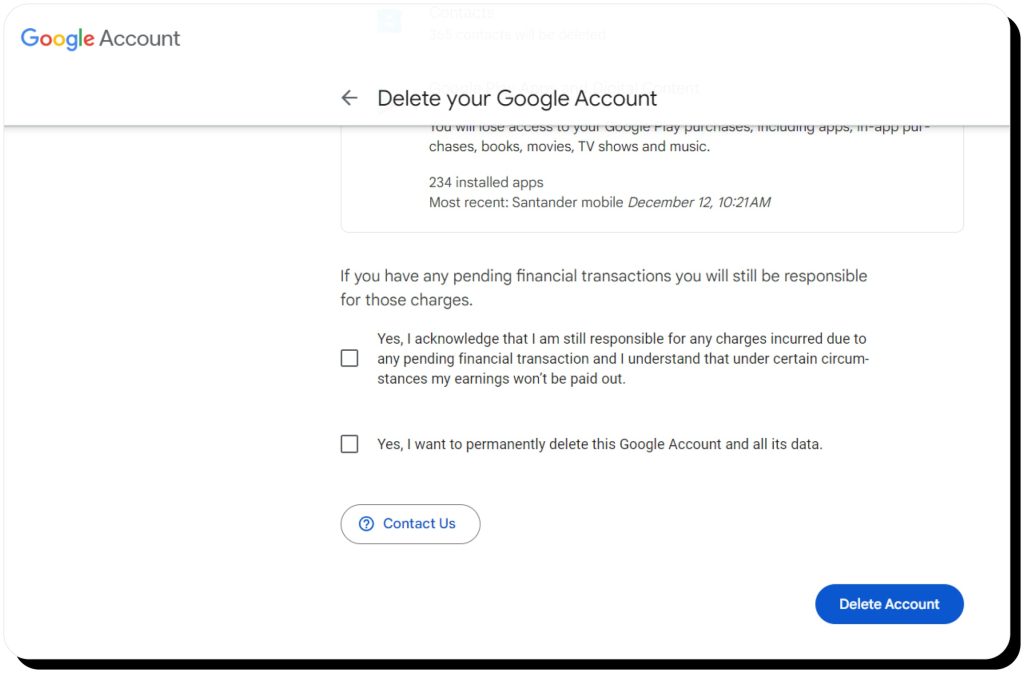
8. Request public records be made private or removed
Public records include most forms of public data collected and maintained by government institutions. These records are considered a matter of public interest, so they are made available to anyone. Depending on the privacy laws in your jurisdiction, they can include driving records, marriage records, criminal records, and more.
Some of these documents may contain sensitive information about you or your family members. They may contain current or outdated content describing properties you own or other financial records you don’t wish to make public.
Most US states allow residents to seal public records under certain circumstances. You may need to prove that you are:
- A victim of stalking or domestic violence,
- An adult with a juvenile arrest record for a minor crime, or
- Someone whose personal information may put public safety at risk
Even if these conditions don’t apply, you may still be able to convince the court to seal your records and prevent them from being available online. You will need to go to the county clerk’s office and ask what you can do about public records containing your information.
The county clerk may give you several options, like redacting certain pieces of data from your documents, changing data to anonymize it, and more. For example, you may be able to list your initials on certain public documents instead of your full name. Or you may be able to change your home address to an anonymous PO box.
After you do this, you will need to go to your local DMV and do the same. Your driving record and vehicle ownership history will be on file here. The DMV may be willing to change your home address to an anonymous PO box if you request it in person, as well.
9. Contact former employers, clubs, and organizations
Any organization you used to be a part of may have information about you posted on their website. This might include anything from records of your participation at certain events to copies of your work history.
In most cases, you were the person who originally approved the organization publishing this kind of personal info about you online. It may have been part of your employment contract, or written into the terms of membership for the organization. This is also common for charity organizations and non-profits who wish to advertise their activities to the public.
However, you probably did not give these organizations unlimited rights to use your image and personal data indefinitely. If you are no longer a member of that organization, you are well within your rights to make a removal request and demand they take down your information.
If you are still a member of the organization, you may also be able to convince them to remove your information. This depends on the specific terms of membership between you and the organization in particular. For instance, some employers may require you to allow them to use your image publicly. Successfully completing the removal process may require actually leaving the company altogether.
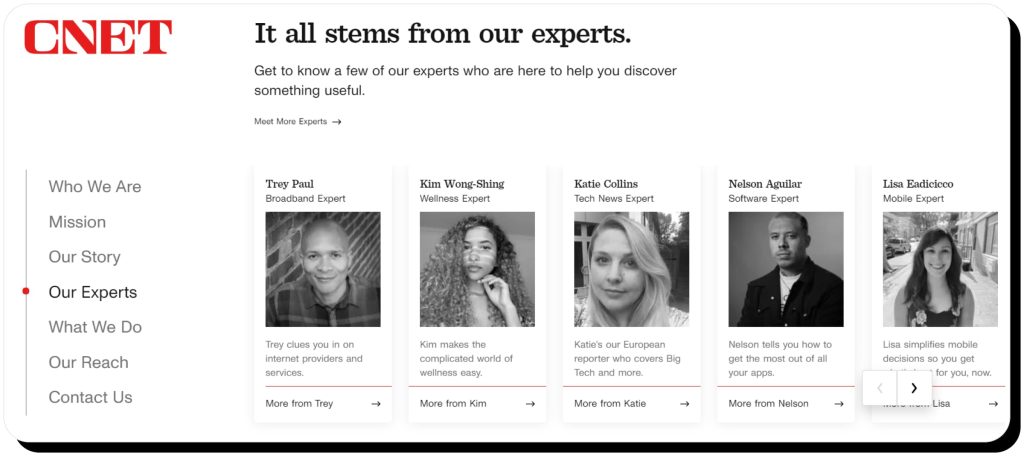
10. Delete shopping accounts you don’t use anymore
Online shops routinely collect data and share it with marketing companies and advertisers. You may not be aware of this happening, but it’s often included in the terms and conditions provided to you when you first sign up for the online account.
Many e-commerce sites provide tempting discounts and other bargains to incentivize new signups. Chasing these deals can quickly lead to you providing advertisers with a wealth of information about yourself, making it much harder to maintain online privacy.
Deleting these accounts won’t stop the marketers from sharing private information they already have. However, it can help you keep future marketers and scammers from getting your contact details and other pieces of personal information from online stores.
If the store you signed up for is a member of the Digital Advertising Alliance, you should be able to remove personal information and protect it from being shared with marketers without having to close the account entirely. When you make new online shopping accounts, prioritize online stores that adhere to DAA principles.
11. Remove your data from AI training sets
One of the more recent ways organizations might misuse your information is including it in large-scale AI training parameters. Any information you make available to the public could be included in one of these datasets. That includes people-search sites’ records, public contact details, and app activities recorded in third-party cookies.
Even private information like your Google search history could be used in this context. Google has confirmed it uses scraped web data to build its AI models. It doesn’t mention whether this includes data gathered from Google browser extensions, location tracking, or other activity controls. Your online activity is a valuable source of data for AI training, and there are no privacy laws preventing major AI companies like Google from using that data.
In fact, there are very few activity controls regulating the use of public records for AI training at all. Large AI companies may be able to use your criminal records, driving records, marriage records, public financial records, and more. For private records like your email inbox, it’s unclear whether email providers can use that information or not.
To protect yourself from this risk, you may need to log into your online accounts with major tech companies and configure your privacy settings appropriately. Be aware that each company has different privacy policies — if you don’t agree with the policy, you may have no other option but to close your account. If you use a popular service like Gmail, that might mean losing your primary email address and registering new email addresses elsewhere.
FAQs
What are the risks of having personal information available online?
The more personal information is available about you online, the more likely you are to be targeted with e-commerce scams, identity theft, and financial fraud. Personally identifiable information may give advertisers, hackers, and scammers the details they need to hijack your accounts, impersonate you, and defraud you.
Can I remove myself completely from the Internet?
There is no way to guarantee your information is wiped off the internet entirely. However, you can take steps to minimize your exposure, reducing the risk of identity theft and fraud. Some information about you may persist on certain websites, but you can reduce the overall amount available to the public.
How do I remove my house from Google Maps?
Search for your home on Google Maps and open Street View. Navigate to your home and then click on Report a Problem at the bottom right of your screen. Google will provide you with a form to fill out. Request the deletion of your home address and images due to privacy concerns and Google will blur the image within a few days.
Can I remove mugshots from the Internet?
Mugshots are public records, which means you’ll have to contact the court and submit a request to have your record sealed or removed. You will also have to contact website owners and ask them to remove the mugshot as well.
Take control of your public data
Learning how to remove your information from the Internet is not a simple one-time task. It’s a continuous process that demands constant attention. Nothing stops data brokers and third-party sites from agreeing to remove your information from the internet when you ask them, and then simply collecting it again after they think you’ve forgotten.
Take proactive measures to prevent the exposure of your sensitive data, review privacy settings in all your accounts, limit third-party access, exercise proper digital hygiene, and regularly monitor your digital footprint.
Remember that online privacy is an ongoing commitment, and staying informed and proactive is the key to a secure digital presence.

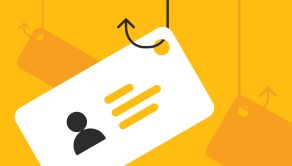



Dimitri is a tech entrepreneur and founder of Onerep, the first fully automated data removal service. Top cybersecurity CEO of 2021 by The Software Report.